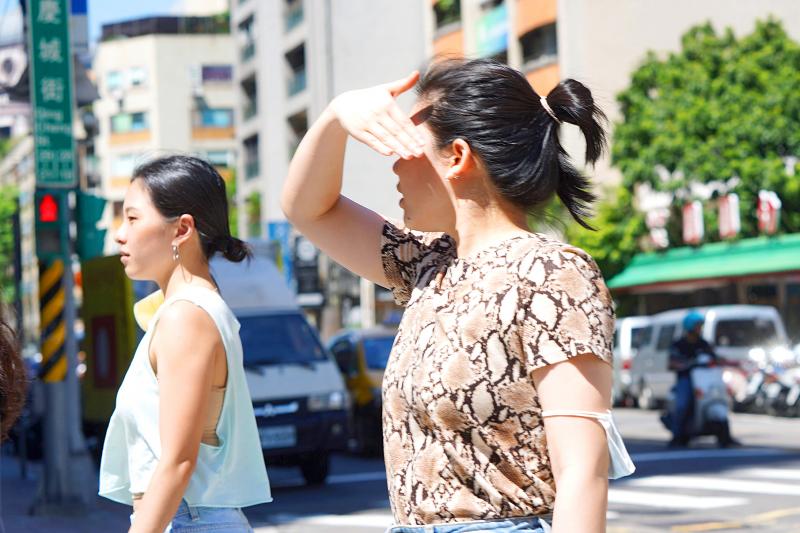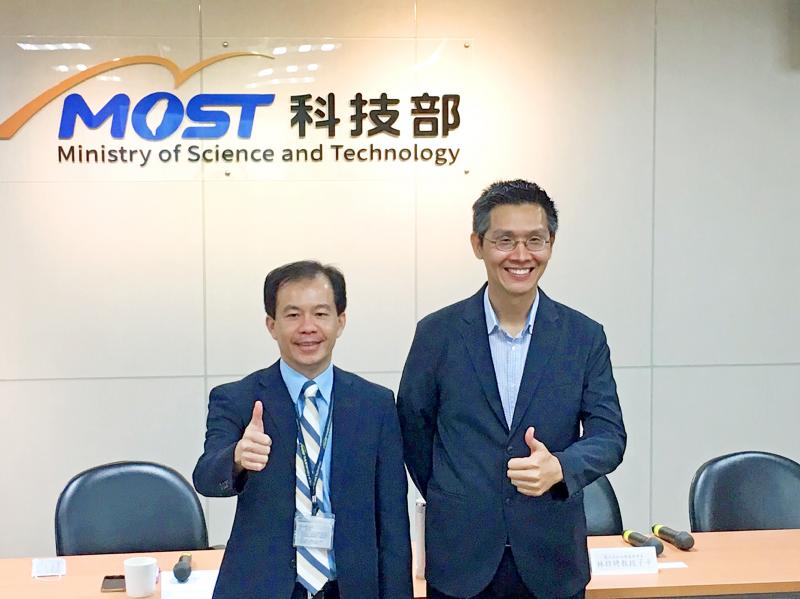An academic yesterday introduced a microclimate assessment system to identify warmer areas in cities as he advised urban planners to “set aside a pathway for the wind” to mitigate the urban heat island effect.
Global warming might be a distant issue for some people, but the urban heat island effect, or urban warming, is an everyday reality that affects people’s health and increases their power bills, National Cheng Kung University architecture professor Lin Tzu-ping (林子平) told a news conference at the Ministry of Science and Technology in Taipei.
Lin said he seeks solutions to urban warming at his Building and Climate Laboratory at the university.

Photo: CNA
To understand microclimate systems in cities, his team has installed 150 to 200 thermometers on lighting poles in Taipei, New Taipei City, Taichung, Tainan and Kaohsiung over the past three years, Lin said.
The team also used anemometers to collect pertinent data in selected hotspots, he added.
Citing last year’s findings, Lin said that the average summer nighttime temperature in central Tainan was found to be 3°C to 4°C higher than in the suburbs.

Photo: Yang Mien-chieh, Taipei Times
The team’s simulations showed that every square meter of a house in downtown Tainan might consume an additional 19 kilowatt-hours of electricity per year compared with that of a house in the suburbs, he said.
In Taipei and New Taipei City, residents living near the Keelung River (基隆河) and the Sindian River (新店溪) might not feel as cool as they had expected, as artificial structures block the wind blowing from the rivers, Lin said.
Cooling, ventilating and shading are three key methods to mitigate urban warming, the team said, citing its findings.
These could be achieved by building more green landscape and shading structures, and leaving pathways for the wind, as well as using less air conditioning, Lin said.
The team has presented its findings to the five municipalities to help them improve their management of buildings, he added.
However, the data could not be incorporated into the Central Weather Bureau’s public notification channels, as the information is not precise enough, he said.
Nonetheless, the data might offer useful information about apparent temperature, by which people could decide whether to visit a location, he said, adding that some government agencies in Japan regularly announce such temperature indices.
A mobile app for the assessment system is being tested, Lin said.
After the app becomes available, the team’s microclimate data might be used to improve tourism services, the efficiency of agricultural and fisheries sectors, labor safety standards and large-scale urban renewal planning, he said.

Taiwan is stepping up plans to create self-sufficient supply chains for combat drones and increase foreign orders from the US to counter China’s numerical superiority, a defense official said on Saturday. Commenting on condition of anonymity, the official said the nation’s armed forces are in agreement with US Admiral Samuel Paparo’s assessment that Taiwan’s military must be prepared to turn the nation’s waters into a “hellscape” for the Chinese People’s Liberation Army (PLA). Paparo, the commander of the US Indo-Pacific Command, reiterated the concept during a Congressional hearing in Washington on Wednesday. He first coined the term in a security conference last

Prosecutors today declined to say who was questioned regarding alleged forgery on petitions to recall Democratic Progressive Party (DPP) legislators, after Chinese-language media earlier reported that members of the Chinese Nationalist Party (KMT) Youth League were brought in for questioning. The Ministry of Justice Investigation Bureau confirmed that two people had been questioned, but did not disclose any further information about the ongoing investigation. KMT Youth League members Lee Hsiao-liang (李孝亮) and Liu Szu-yin (劉思吟) — who are leading the effort to recall DPP caucus chief executive Rosalia Wu (吳思瑤) and Legislator Wu Pei-yi (吳沛憶) — both posted on Facebook saying: “I

The Ministry of Economic Affairs has fined Taobao NT$1.2 million (US$36,912) for advertisements that exceed its approved business scope, requiring the Chinese e-commerce platform to make corrections in the first half of this year or its license may be revoked. Lawmakers have called for stricter enforcement of Chinese e-commerce platforms and measures to prevent China from laundering its goods through Taiwan in response to US President Donald Trump’s heavy tariffs on China. The Legislative Yuan’s Finance Committee met today to discuss policies to prevent China from dumping goods in Taiwan, inviting government agencies to report. Democratic Progressive Party Legislator Kuo Kuo-wen (郭國文) said

The Ministry of Economic Affairs has fined Taobao NT$1.2 million (US$36,900) for advertisements that exceeded its approved business scope and ordered the Chinese e-commerce platform to make corrections in the first half of this year or its license would be revoked. Lawmakers have called for stricter supervision of Chinese e-commerce platforms and more stringent measures to prevent China from laundering its goods through Taiwan as US President Donald Trump’s administration cracks down on origin laundering. The legislature’s Finance Committee yesterday met to discuss policies to prevent China from dumping goods in Taiwan, inviting government agencies to report on the matter. Democratic Progressive Party